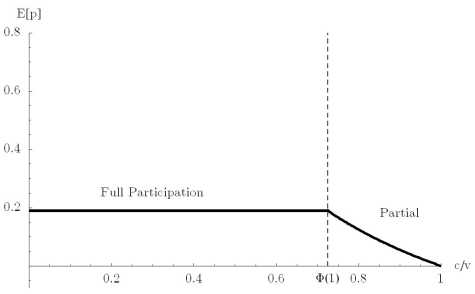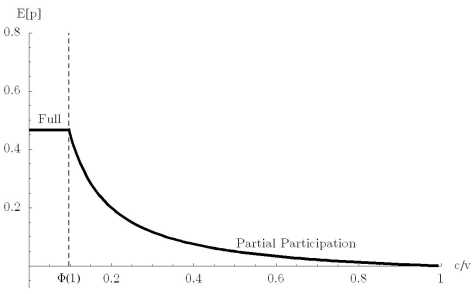
(a) c = 0.5 and μ = 0.8
Figure 4: The impact of v on expected price (N = 2)

(b) c = 0.05 and μ = 0. 1
d. The effects of an increase in the number of firms N
Under partial participation, it immediately follows from the equilibrium condition v - E [p] - c = 0
that an increase in N does not affect expected price. The underlying economic forces that bring
about this result are, however, less straightforward. We have noted before that Φ(θ 1; μ; N) is
decreasing in N. This means that without a change in θ1 expected prices would rise: as N increases
it becomes more and more unlikely that an individual firm sells to the shoppers and each firm tends
to concentrate more and more on selling to the non-shoppers. Therefore, expected price would rise
for a given θ1 . Higher expected prices means, however, that a larger fraction of non-shoppers prefers
not to buy and this effect exactly offsets the first effect.
The analysis for the case of full participation follows Stahl (1989) and he shows that expected
prices rise in N . Intuitively, only the first effect discussed above is relevant here as θ1 is fixed to be
equal to 1. In the limit, Stahl (1989) shows that expected price converges to the monopoly price
and the Diamond result holds.
It is then interesting to see which equilibrium arises for which values of N . We will argue that
for given c/v and μ when N becomes sufficiently large, the equilibrium is characterized by partial
participation. What happens as N increases is that, if the non-shoppers keep searching for one
price with probability one, expected price tend to the monopoly price and eventually, the condition
v — E[p] — c > 0 is violated. This is easily seen upon inspection of (10) and noting that Φ(1; μ, N)
declines monotonically with N and converges to zero as N approaches infinity. The implication
of this is that starting from an equilibrium with full participation our model does not yield the
13
More intriguing information
1. The name is absent2. Foreword: Special Issue on Invasive Species
3. L'organisation en réseau comme forme « indéterminée »
4. Mergers and the changing landscape of commercial banking (Part II)
5. Does Competition Increase Economic Efficiency in Swedish County Councils?
6. Der Einfluß der Direktdemokratie auf die Sozialpolitik
7. Are class size differences related to pupils’ educational progress and classroom processes? Findings from the Institute of Education Class Size Study of children aged 5-7 Years
8. WP 48 - Population ageing in the Netherlands: Demographic and financial arguments for a balanced approach
9. Strategic Investment and Market Integration
10. Are Japanese bureaucrats politically stronger than farmers?: The political economy of Japan's rice set-aside program